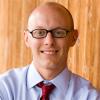It is striking to think about how the digital divide affects the church. I think of the launch of the new NCR web site last week, and wonder how many people even have a shot at accessing my column here.
Let's rule out language as a variable and just pretend that everyone in the world who has the Internet would want to visit the NCR web site and read my article. Who would that be?
According to Internet World Stats, only 5.6 percent of the population of Africa uses the Internet. Internet users in the Middle East has grown astronomically by 1,296 percent between 2000 and 2008, yet a little less than one in four Middle Easterners use the Internet. This parallels the world population's internet usage rate of 23.5 percent. This contrasts with three out of every four North Americans using the Internet.
It seems likely, then, that whatever column gets sent to NCR -- or any other of the myriad of web sites, blogs, etc. in cyberspace – its best chance at being accessed is going to by North Americans.
The same goes for the Vatican’s web site. The Vatican’s web site does a pretty good job of avoiding language as a barrier by giving visitors a choice of seven languages, and it is certainly true that Roman Catholics today have much more access to their church's teachings than even a generation ago because of its Internet presence. There is still a long way to go before the entire world has equal access to papal teachings and the promulgations of bishops.
But wait. Doesn't the word 'catholic' mean universal? How is the disparity in online access affecting being part of a worldwide institution such as the Roman Catholic church?
I recently heard of the American Catholic Council, formed Jan. 25, 2009 (the 50 year anniversary of the announcement of the Second Vatican Council). The council is to meet in Detroit in 2011. The stated mission is "to fulfill the promise of Vatican II to create a more responsive, accountable, church that calls on the active participation of all its people -- a church that more closely models the American experience."
This brings up a couple interesting questions: Should the church (a worldwide institution) be emulating the American experience? Should America emulate the church and teachings of the Gospel? These are complex questions that I cannot answer here. I just fear history will repeat itself. One of the main global concerns about the agenda of Vatican II was that it was primarily developed by U.S. and western European bishops, thereby forgetting a large portion of the Catholic world residing in South America, Asia and Africa.
What is interesting is that I'm not sure how many people know about the American Catholic Council. Unless you come across it in Google search or have a friend involved in its planning, how does a person learn about it? The American Catholic Council is trying to reach out to people -- particularly non-whites, younger people, even more conservative Catholics -- and get them involved in the process. However, it seems that you can rule out a quarter of the American population from being involved, since it seems that having access to e-mail and the Internet is required to be truly engaged. You can rule out another three-quarters of the population from mobilizing to put on their own national synods, since the lack of online access for organizing something so large and inclusive persists.
Another stated goal of the gathering is "to produce recommendations that will move our church into the 21st century and reflect the best thinking of the people of God." I don't doubt that this is a forward-thinking group of faithful Catholics, but I wonder if the church really needs more American input on the way the church works? Catholic News Service estimates that there are 1.131 billion Catholics worldwide and between 50 million to 80 million in the United States. Even if you round up, the U.S. Catholic population makes up less than 10 percent of the world.
I personally tend to agree with many of the stances that the American Catholic Council is taking on issues related to the church. What I can't get my head around is how to reconcile the grand ideal of taking American democracy to a church that resides all over the world and with members who have unequal access to participate in the online dialogue that is beginning to shape what it means to be 'Catholic.' One hopes that strategies on how to reconcile this will be developed.
Mike Sweitzer-Beckman recently earned his Master of Divinity degree from the Jesuit School of Theology. He works at Forward Community Investments, a statewide loan fund for nonprofits that serve low-income people in Wisconsin. His hobbies include tennis, bicycling, spectator sports, and cooking.


